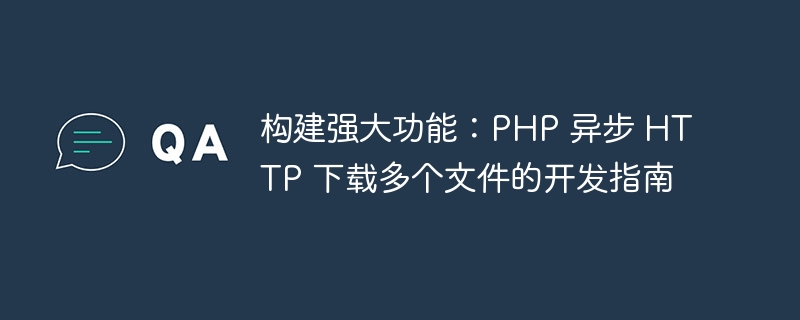

Building powerful functions: PHP asynchronous HTTP development guide for downloading multiple files
Introduction:
In network applications, it is often necessary to download multiple files from a remote server file, this process can be time-consuming and require significant network bandwidth. In order to improve download efficiency and run concurrency, we can use PHP's asynchronous HTTP request function to implement parallel downloads of multiple files. This article will introduce how to use the PHP asynchronous HTTP request library Guzzle to implement asynchronous downloading of multiple files, and provide corresponding development guidelines.
1. Installation and Configuration Guzzle
To use Guzzle, you first need to install it. Guzzle can be quickly introduced into PHP projects through Composer. Execute the following command in the project root directory:
composer require guzzlehttp/guzzle
After the installation is complete, we can use JavaScript home page olars technology to instruct anuts to perform asynchronous HTTP requests using the method provided by Guzzle.
2. Basic usage
First, we need to create a client instance of Guzzle. You can create a Guzzle client through the following code:
$client = new GuzzleHttpClient();
Next, we can use Guzzle’s get() method to send an asynchronous HTTP request. This method accepts a URL string as a parameter and returns a Promise object representing the asynchronous execution of the request.
$promise = $client->get('http://example.com/file1.txt');If you want to send multiple asynchronous HTTP requests at the same time, we can use Guzzle's pool() method. This method accepts an array containing multiple requests as a parameter and returns an array of Promise objects representing the asynchronous execution of multiple requests.
$promises = [
$client->getAsync('http://example.com/file1.txt'),
$client->getAsync('http://example.com/file2.txt'),
$client->getAsync('http://example.com/file3.txt'),
];
$results = GuzzleHttpPromiseUtils::settle($promises)->wait();3. Processing download results
After the asynchronous request is completed, we can process the result of the request through the then() method of the Promise object. For example, you can use the then() method to save the downloaded file to the local disk:
$promise->then(function (ResponseInterface $response) {
// 保存文件到本地磁盘
file_put_contents('path/to/output.txt', $response->getBody());
});When processing the results of multiple asynchronous requests, we can use the Promise auxiliary tool class provided by Guzzle Utils::settle() Method to wait for all requests to complete and return the result array.
4. Implement asynchronous downloading of multiple files
In actual applications, multiple files usually need to be downloaded. We can use a loop structure to iterate through the file list and send an asynchronous HTTP request in each loop to achieve parallel downloading of multiple files. The following is a simple example:
$files = [
'http://example.com/file1.txt',
'http://example.com/file2.txt',
'http://example.com/file3.txt',
];
$promises = [];
foreach ($files as $file) {
$promises[] = $client->getAsync($file);
}
$results = GuzzleHttpPromiseUtils::settle($promises)->wait();
foreach ($results as $result) {
if ($result['state'] === 'fulfilled') {
$response = $result['value'];
file_put_contents('path/to/' . basename($response->getEffectiveUrl()), $response->getBody());
} else {
echo 'Error: ' . $result['reason'] . PHP_EOL;
}
}Summary:
By using the PHP asynchronous HTTP request library Guzzle, we can easily implement parallel downloads of multiple files, improving download efficiency and running concurrency capabilities. This article introduces how to install and configure Guzzle, as well as the basic usage of Guzzle to perform asynchronous HTTP requests and how to process download results. I hope this article can provide a reference and guidance for developers to achieve a more powerful and efficient network download function.
The above is the detailed content of Building Power: A Development Guide for PHP Asynchronous HTTP Download of Multiple Files. For more information, please follow other related articles on the PHP Chinese website!
 How to open php file
How to open php file
 How to solve the problem that Apple cannot download more than 200 files
How to solve the problem that Apple cannot download more than 200 files
 How to remove the first few elements of an array in php
How to remove the first few elements of an array in php
 What to do if php deserialization fails
What to do if php deserialization fails
 How to connect php to mssql database
How to connect php to mssql database
 How to connect php to mssql database
How to connect php to mssql database
 How to upload html
How to upload html
 How to solve garbled characters in PHP
How to solve garbled characters in PHP